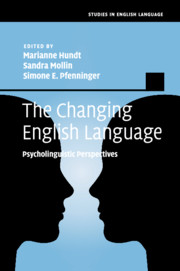Crossref Citations
This Book has been
cited by the following publications. This list is generated based on data provided by Crossref.
2016.
References.
Language Learning,
Vol. 66,
Issue. S1,
p.
313.
Gardner, Anne-Christine
Hundt, Marianne
and
Kindlimann, Moira
2017.
Digitization of the Mary Hamilton Papers.
ICAME Journal,
Vol. 41,
Issue. 1,
p.
83.
Hilpert, Martin
2018.
Grammaticalization Meets Construction Grammar.
Vol. 21,
Issue. ,
p.
21.
Curuksu, Jeremy David
2018.
Data Driven.
p.
87.
Noël, Dirk
2019.
The decline of the Deontic nci construction in Late Modern English.
Cognitive Linguistic Studies,
Vol. 6,
Issue. 1,
p.
22.
Vetchinnikova, Svetlana
2019.
Phraseology and the Advanced Language Learner.
Speyer, Lydia Gabriela
and
Schleef, Erik
2019.
Processing ‘Gender-neutral’ Pronouns: A Self-paced Reading Study of Learners of English.
Applied Linguistics,
Vol. 40,
Issue. 5,
p.
793.
Fonteyn, Lauren
and
Nini, Andrea
2020.
Individuality in syntactic variation: An investigation of the seventeenth-century gerund alternation.
Cognitive Linguistics,
Vol. 31,
Issue. 2,
p.
279.
Bizzoni, Yuri
Degaetano-Ortlieb, Stefania
Fankhauser, Peter
and
Teich, Elke
2020.
Linguistic Variation and Change in 250 Years of English Scientific Writing: A Data-Driven Approach.
Frontiers in Artificial Intelligence,
Vol. 3,
Issue. ,
Vetchinnikova, Svetlana
and
Hiltunen, Turo
2020.
Language Change.
p.
205.
Fischer, Olga
2020.
The Handbook of Historical Linguistics.
p.
314.
De Troij, Robbert
and
Van de Velde, Freek
2020.
Beyond Mere Text Frequency: Assessing Subtle Grammaticalization by Different Quantitative Measures. A Case Study on the Dutch Soort Construction.
Languages,
Vol. 5,
Issue. 4,
p.
55.
Mauranen, Anna
2020.
Language Change.
p.
95.
Stein, Dieter
2020.
Historical Linguistics 2017.
Vol. 350,
Issue. ,
p.
317.
Singleton, David
and
Leśniewska, Justyna
2021.
The Critical Period Hypothesis for L2 Acquisition: An Unfalsifiable Embarrassment?.
Languages,
Vol. 6,
Issue. 3,
p.
149.
Hartmann, Stefan
and
Pleyer, Michael
2021.
Constructing a protolanguage: reconstructing prehistoric languages in a usage-based construction grammar framework.
Philosophical Transactions of the Royal Society B: Biological Sciences,
Vol. 376,
Issue. 1824,
Stolk, Joanne Vera
2021.
A cognitive approach to spelling production in historical sources: explaining the variation between <ɛ, αι> and <ο, ω> in Greek documentary papyri.
Transactions of the Philological Society,
Vol. 119,
Issue. 3,
p.
289.
Mair, Christian
2021.
Recent advances in the corpus-based study of ongoing grammatical change in English.
Text & Talk,
Vol. 41,
Issue. 5-6,
p.
763.
Van de Velde, Freek
De Pascale, Stefano
and
Speelman, Dirk
2022.
Generalizability in mixed models: Lessons from corpus linguistics.
Behavioral and Brain Sciences,
Vol. 45,
Issue. ,
Mair, Christian
2022.
Migration, media, and the emergence of pidgin‐ and creole‐based informal epicentres.
World Englishes,
Vol. 41,
Issue. 3,
p.
414.



